Deck 13: Dansk Minox
Question
Question
Question
Question

Unlock Deck
Sign up to unlock the cards in this deck!
Unlock Deck
Unlock Deck
1/4
Play
Full screen (f)
Deck 13: Dansk Minox
1
Can you construct a "value chain" (see Exhibit 6) of costs and profits from the pulp mill all the way through to the supermarket for milk, for dairy orange juice, and for Minute Maid orange juice Present all calculations on the basis of one ton of board. Use the format outlined in Exhibit 7.
(a)
Value chain from the pulp mill to the supermarket for milk, for dairy orange juice, and for Minute Maid orange juice:
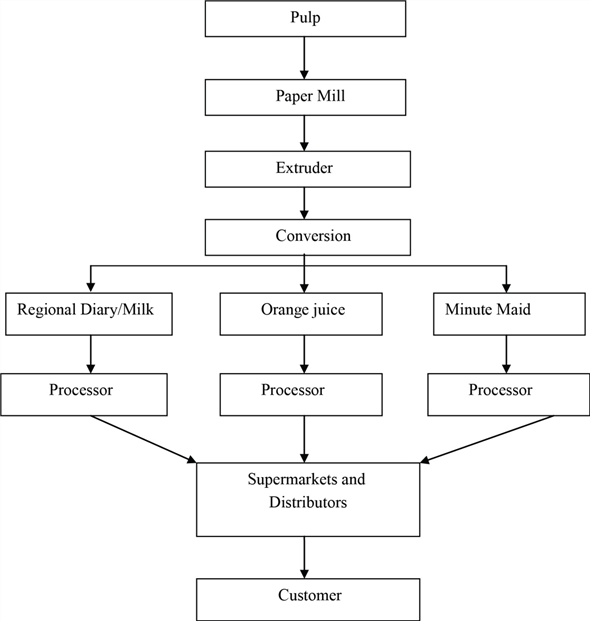 (b)
(b)
Calculations on the basis of one tone of board:
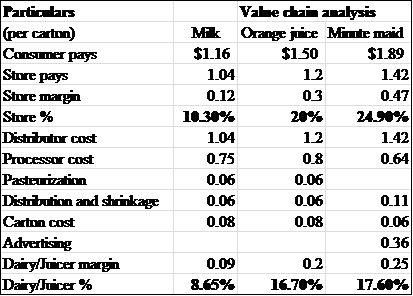
Value chain from the pulp mill to the supermarket for milk, for dairy orange juice, and for Minute Maid orange juice:
 (b)
(b) Calculations on the basis of one tone of board:

2
What insights for the business does the "value chain" provide For example, of the total profit earned per ton of board, how much is earned by the supermarket, by the processor, and by Champion (Use a format like Exhibit 8). So what
Insight from the value chain :
The following analysis can be made in terms of margins per ton of board from the value chain of Dairy Pak as mentioned in exhibit 8:
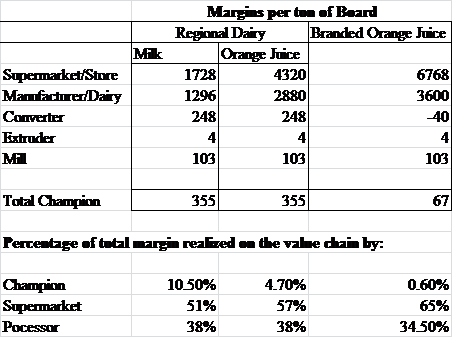 In the above spreadsheet, margin per ton of board is calculated for each stage of value chain as per the segment. Then, percentage of total margin realized on the value chain is determined.
In the above spreadsheet, margin per ton of board is calculated for each stage of value chain as per the segment. Then, percentage of total margin realized on the value chain is determined.
The following analysis can be made in terms of margins per ton of board from the value chain of Dairy Pak as mentioned in exhibit 8:
 In the above spreadsheet, margin per ton of board is calculated for each stage of value chain as per the segment. Then, percentage of total margin realized on the value chain is determined.
In the above spreadsheet, margin per ton of board is calculated for each stage of value chain as per the segment. Then, percentage of total margin realized on the value chain is determined. 3
When asset data (as shown here) is included, what inferences do you draw about ROA for Champion, the dairy, the juice processor and the retailer (Use a format like Exhibit 9):
Assets in the Process Flow
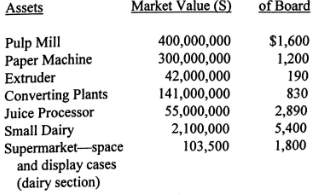
Assets in the Process Flow

Analysis of return on assets (ROA) for Champion, the dairy, the juice processor and the retailer when asset data is included :
The following analysis can be made in terms of return on assets when asset data is included:
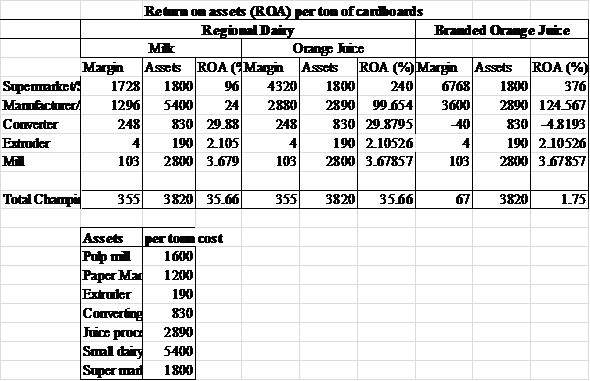 In the above spreadsheet, return on assets (ROA) is calculated as per the format mentioned in the exhibit 9. ROA is calculated as margin as a percentage of assets amount for milk, orange juice and branded orange juice at each stage of the value chain.
In the above spreadsheet, return on assets (ROA) is calculated as per the format mentioned in the exhibit 9. ROA is calculated as margin as a percentage of assets amount for milk, orange juice and branded orange juice at each stage of the value chain.
The following analysis can be made in terms of return on assets when asset data is included:
 In the above spreadsheet, return on assets (ROA) is calculated as per the format mentioned in the exhibit 9. ROA is calculated as margin as a percentage of assets amount for milk, orange juice and branded orange juice at each stage of the value chain.
In the above spreadsheet, return on assets (ROA) is calculated as per the format mentioned in the exhibit 9. ROA is calculated as margin as a percentage of assets amount for milk, orange juice and branded orange juice at each stage of the value chain. 4
Note that unless a major expansion were undertaken. Champion's output is limited to about 250,000 tons per year of coated board. Which segment[s] do you believe should be targeted

Unlock Deck
Unlock for access to all 4 flashcards in this deck.
Unlock Deck
k this deck


